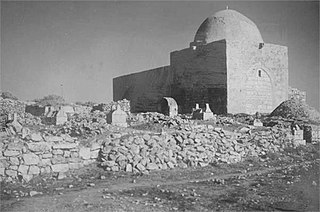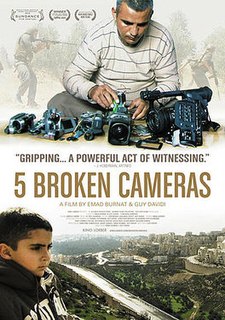Related Research Articles

Bethlehem is a city in the central West Bank, Palestine, about 10 km south of Jerusalem. Its population is approximately 25,000, and it is the capital of the Bethlehem Governorate of the State of Palestine. The economy is primarily tourist-driven, peaking during the Christmas season, when Christians make pilgrimage to the Church of the Nativity. The important holy site of Rachel's Tomb is at the northern entrance of Bethlehem, though not freely accessible to the city's own inhabitants and in general Palestinians living in the occupied West Bank due to the Israeli West Bank barrier.

Palestinian Christians are Christian citizens of the State of Palestine. In the wider definition of Palestinian Christians, including the Palestinian refugees, diaspora and people with full or partial Palestinian Christian ancestry this can be applied to an estimated 500,000 people worldwide as of 2000. Palestinian Christians belong to one of a number of Christian denominations, including Eastern Orthodoxy, Oriental Orthodoxy, Catholicism, Anglicanism, Lutheranism, other branches of Protestantism and others. Bernard Sabella of Bethlehem University estimates that 6% of the Palestinian population worldwide is Christian and that 56% of them live outside of the region of Palestine. In both the local dialect of Palestinian Arabic and in Classical Arabic or Modern Standard Arabic, Christians are called Nasrani or Masihi. Hebrew-speakers call them Notzri, which means Nazarene.

Rachel's Tomb is a site revered as the burial place of the Biblical matriarch Rachel. The site is also referred to as the Bilal bin Rabah mosque. The tomb is held in esteem by Jews, Christians, and Muslims. The tomb, located at the northern entrance to the Palestinian city of Bethlehem, next to the Rachel's Tomb checkpoint, is built in the style of a traditional maqam, Arabic for shrine.

Hany Abu-Assad is a Palestinian-Dutch film director. He has received two Academy Award nominations: in 2006 for his film Paradise Now, and again in 2013 for his film Omar.

Cinema of Palestine is relatively young in comparison to Arab cinema as a whole. Palestinian films are not exclusively produced in Arabic and some are even produced in English and French. Elia Suleiman has emerged as one of the most notable working Palestinian directors.

Mohammad Bakri is a Palestinian actor and film director.

Annemarie Jacir is a Palestinian filmmaker, writer, and producer.

Mitri Raheb is a Palestinian Christian, the pastor of the Evangelical Lutheran Christmas Church in Bethlehem, and the founder and president of the Diyar Consortium, a group of Lutheran-based, ecumenically-oriented institutions serving the Bethlehem area.
George Bisharat is an American professor of law and frequent commentator on current events in the Middle East, and the Israeli–Palestinian conflict in particular.
Michel Khleifi (Arabic: ميشيل خليفي}, born in 1950 in Nazareth, is a Palestinian of Israeli citizenship film writer, director and producer, presently based in Belgium.

Wedding in Galilee is a 1987 film directed by Michel Khleifi. It was awarded the International Critics Prize at Cannes in 1987.
Manuel Sarkis Hassassian is a Palestinian- Armenian professor, who from late 2005 to October 2018 was the Palestinian Authority's diplomatic representative to the United Kingdom, after being appointed to the position by Palestinian Authority President Mahmoud Abbas.

Michal Aviad is director, script writer, producer and senior lecturer at the Department of Cinema and Television, Tel Aviv University.
Nurith Gertz is an Israeli Professor Emerita of Hebrew literature and film at The Open University of Israel. She served as head of the theoretical track at the Department of Film and Television, at Tel Aviv University, and heads the Department of Culture and Production at Sapir College.

Rana's Wedding, also known as Jerusalem, Another Day, is a Palestinian film released in 2002, produced in partnership with the Netherlands and funded by the Palestinian Film Foundation. The film was shot in Jerusalem under the direction of the Palestinian Director Hany Abu-Assad, he was the first Palestinian film director to reach Cannes Film Festival with his film, that was selected for screening at the International Critics' Week in 2002. The film was also screened at multiple film festivals worldwide and received many excellent international reviews and awards. Rana's Wedding was able to present the Palestinian-Israeli conflict in an exceptional and compelling way, by using romance and dark comedy genres which left the audience astonished by this unique approach, that was able to portray, a vivid image of a Palestinian's daily struggle, towards living a somewhat normal life.

5 Broken Cameras is a 94-minute documentary film co-directed by Palestinian Emad Burnat and Israeli Guy Davidi. It was shown at film festivals in 2011 and placed in general release by Kino Lorber in 2012. 5 Broken Cameras is a first-hand account of protests in Bil'in, a West Bank village affected by the Israeli West Bank barrier. The documentary was shot almost entirely by Palestinian farmer Emad Burnat, who bought his first camera in 2005 to record the birth of his youngest son. In 2009 Israeli co-director Guy Davidi joined the project. Structured around the destruction of Burnat's cameras, the filmmakers' collaboration follows one family's evolution over five years of turmoil. The film won a 2012 Sundance Film Festival award, it won the Golden Apricot at the 2012 Yerevan International Film Festival, Armenia, for Best Documentary Film, won the 2013 International Emmy Award, and was nominated for a 2013 Academy Award.

Mazin Butros Qumsiyeh is a Palestinian scientist and author, founder and director of the Palestine Museum of Natural History (PMNH) and the Palestine Institute for Biodiversity and Sustainability (PIBS) at Bethlehem University where he teaches. After serving on the faculties of the University of Tennessee (1989–1993), Duke University (1993–1999), and Yale University (1999–2005), he now researches and teaches at Bethlehem and Birzeit Universities since 2008. Here Qumsiyeh joined with other professors to introduce the first Biotechnology Masters program in the region. Over the course of his career he has published well over 150 scientific papers on topics ranging from cultural heritage to biodiversity in addition to several books. He also serves on the board of a number of Palestinian youth and service organizations such as Al-Rowwad Children Theater and Siraj Center.

David MacDougall is an American-Australian visual anthropologist, academic, and documentary filmmaker, who is known for his ethnographic film work in Africa, Australia, Europe and India. For much of his career he co-produced and co-directed films with his wife, fellow filmmaker Judith MacDougall. In 1972, his first film, To Live with Herds was awarded the Grand Prix "Venezia Genti" at the Venice Film Festival. He has lived in Australia since 1975, and is currently a professor in the Research School of Humanities & the Arts at Australian National University.

The Present is a 2020 short film directed by Farah Nabulsi and co-written by Nabulsi and Hind Shoufani, about a father and daughter in the Palestinian enclaves of the Israeli-occupied West Bank trying to buy a wedding anniversary gift. The cast is led by Palestinian actor Saleh Bakri. It was released on Netflix on 18 March 2021, and was nominated for the Academy Award for Best Live Action Short Film.
References
- ↑ "Palestine-Family.net".
- ↑ Historical Dictionary of Middle Eastern Cinema - Page 192, Terri Ginsberg, Chris Lippard - 2010
- ↑ Lawrence Davidson - 2013 Islamic Fundamentalism: An Introduction
- ↑ A pictorial history of Ramallah - Page 235, Naseeb Shaheen - 1992